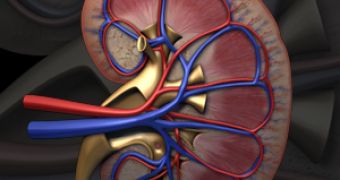A team of researchers writing in the scientific journal Nature describe the results of their having transplanted so-called bioengineered kidneys into rats.
Long story short, these scientists maintain that, despite their not being as efficient as natural ones, these laboratory-grown kidneys did filter the animals' blood and produced significant amounts of urine.
Presently, those suffering with severe forms of kidney diseases need to undergo dialysis on a fairly regular basis if they are to stay alive. Still, they can only be cured with the help of a transplant.
Given the fact that donor kidneys are rather difficult to come by, specialist Harald Ott and his fellow researchers hope that their successfully transplanting laboratory-grown kidneys into rats will ultimately lead to their being able to also use this procedure to treat human patients.
“In an ideal world, if someone walks into the hospital and has a kidney grown on demand, there’s no donor organ shortage and there are no immune problems,” Harald Ott commented with respect to the findings of this series of experiments.
Nature informs us that, in order to grow these kidneys in the laboratory, the researchers started by collecting the kidneys of recently deceased rats and stripping away all of their cells.
Thus, all that remained was the scaffold of connective tissues, on which the researchers later on managed to grow the other tissue types needed to regenerate the organ.
This stage of the process came down to seeding the scaffold with human endothelial and rat kidney cells, the same source reports.
Although these bioengineered kidneys only produced about one third of the amount of urine that natural ones are known to produce, and also cleared one's blood of cretinine at a significantly slower pace, Harald Ott and his colleagues believe that, once further investigations are carried out, their lab-grown organs might prove a noteworthy option for kidney disease sufferers.
“If we can make a graft that works at 20%, that would already make patients independent of haemodialysis,” Harald Ott reportedly said.
Check out the video below for more information on the matter at hand.

 14 DAY TRIAL //
14 DAY TRIAL // 